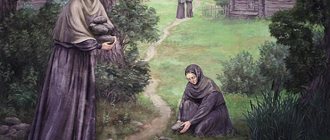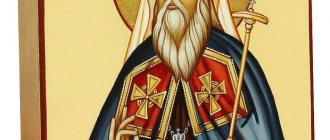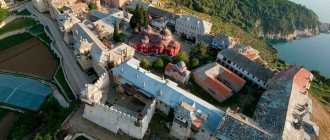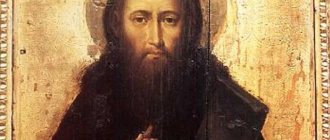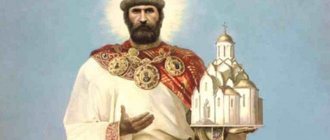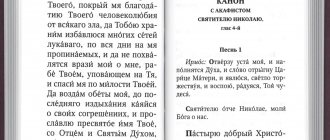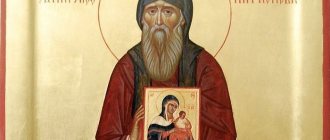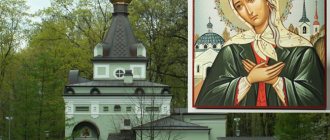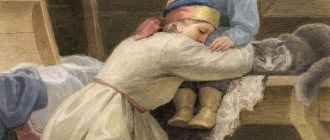The life story of St. Arsenius of Cappadocia
The future saint had the baptismal name Fedor, but is still revered as Arsenius of Cappadocia. He was born on the territory of Cappadocia near the settlement of Faras, which belonged to the Greeks before the Turks took possession of it. The saint's father, Eleutherius Annetsipichosa, was a teacher. And mother Varvara Frangopolu raised the children. Arseny and his younger brother Vlasiy were orphaned at an early age. Both boys lived under the care of their mother's sister.
The future saint studied at the Nigde school, then graduated from a seminary on the territory of Smyrna. When he turned 26 years old, he took monastic vows and became a monk at the Monastery of John the Baptist. He was ordained as a monk by the Metropolitan of Caesarea, Paisius II. A few years later he became a deacon, then was sent home to teach children. Pedagogy demanded extraordinary qualities from the saint; he showed miracles of patience and endurance, and always came to meet the children halfway. In addition, at this time the Turks prevented the Greeks from getting an education, so Arseny’s mission was truly complicated.
After several years of work, he was ordained archimandrite. Then he became a pilgrim. Over the years of wandering, he received the nickname Hadji Efendi from the Turks.
The saint remained in the world, but was a monk and led a life full of asceticism. He prayed intensely, but at the same time took an active civic position and participated in the lives of his fellow villagers. They considered the elder not just a Christian preacher, but came to him to receive life advice and instructions.
The Elder of Cappadocia took care of local churches, tried to open classes and recruit teachers who could pass on their knowledge to the Greeks.
In addition, the archimandrite received the gift of healing. He did not refuse anyone: neither Muslims nor Greek Christians. The patriarchs offered Arseny to head local parishes, but he did not agree. Instead, he accepted the offer to become exarch of the Church of the Holy Sepulchre.
After 1924, the Greeks of Asia Minor were forced to move to Greek territory. Already there the saint fell ill and then died on the island of Corfu. He himself predicted his own death. Even before the onset of his illness, he decided that he would die 40 days after leaving Turkey.
As a child, Arseny was saved by a monk and he also decided to become a monk
One day an incident occurred that turned the whole life of the future Reverend Arseny upside down: while crossing a small river with his brother Blasius, Fyodor was carried away by a fast current.
1840
This year, Arseny was born in the Cappadocia village of Farasy (Asia Minor).
The elder brother began to pray for his salvation, when suddenly Fyodor appeared in front of him, safe and sound.
The kid said that one horseman, very similar to a monk, snatched him out of the water and carried him to the shore on horseback.
Then Fyodor firmly decided to become a monk.
Prayers
First
Have mercy on me, O God, according to Your great mercy, and according to the multitude of Your compassions, cleanse my iniquity. Above all, wash me from my iniquity, and cleanse me from my sin; for I know my iniquity, and I will take away my sin before me. I have committed sins and evil before You alone; for you may be justified in all of Your words, and may be victorious when you judge Thy. Behold, I was conceived in iniquity, and my mother gave birth to me in sins. Behold, you have loved the truth; You have revealed to me the unknown and secret wisdom of Yours. Sprinkle me with hyssop, and I will be cleansed; Wash me, and I will be whiter than snow. My hearing brings joy and joy; humble bones will rejoice. Turn Your face away from my sins and cleanse all my iniquities. Create in me a pure heart, O God, and renew a right spirit in my womb. Do not cast me away from Your presence and do not take Your Holy Spirit away from me. Reward me with the joy of Your salvation and strengthen me with the Lord’s Spirit. I will teach the wicked Your way, and the wicked will turn to You. Deliver me from bloodshed, O God, God of my salvation; My tongue will rejoice in Your righteousness. Lord, open my mouth, and my mouth will declare Your praise. As if you had desired sacrifices, you would have given them: you do not favor burnt offerings. The sacrifice to God is a broken spirit; God will not despise a broken and humble heart. Bless Zion, O Lord, with Your favor, and may the walls of Jerusalem be built. Then favor the sacrifice of righteousness, the offering and the burnt offering; Then they will place the bullock on Your altar.
Second
O sacred head, reverend father, blessed Abvo Arseny, do not forget your poor to the end, but always remember us in holy and auspicious prayers to God: remember your flock, which you yourself shepherded, and do not forget to visit your children, pray for us, father sacred, for your spiritual children, as you have boldness towards the Heavenly King: do not keep silent to the Lord for us, and do not despise us, who honor you with faith and love: remember us unworthy at the Throne of the Almighty, and do not stop praying for us to Christ God, for You have been given the grace to pray for us. We do not imagine that you are dead: even though you have passed away from us in body, you remain alive even after death, do not depart from us in spirit, keeping us from the arrows of the enemy and all the charms of the demonic and the snares of the devil, our good shepherd. Even if your relics are always visible before our eyes, but your holy soul with the angelic hosts, with the disembodied faces, with the heavenly powers, standing at the throne of the Almighty, worthily rejoices, knowing that you are truly alive even after death, we fall down to you and We pray to you: pray for us to the Almighty God, for the benefit of our souls, and ask us time for repentance, so that we may pass from earth to heaven without restraint, from bitter ordeals, from demons of air princes and from eternal torment, may we be delivered from eternal torment, and may we be heirs of the Heavenly Kingdom with all the righteous, who from all eternity have pleased our Lord Jesus Christ: to Him belongs all glory, honor and worship, with His Beginning Father, and with His Most Holy and Good and Life-giving Spirit, now and ever, and unto ages of ages. Amen.
Troparion to St. Arsenius of Cappadocia, tone 3
Having ended a life pleasing to God with goodness,/ you have appeared as an honorable vessel of the Comforter, O God-bearing Arseny,/ you have received miracles of grace, you have given quick help to everyone,/ Father Reverend,/ to Christ I pray to God // to grant us great mercy.
Healer's activities
There was not a single doctor in Faras and its surroundings, so the task of treatment was entrusted to Saint Arsenios. The monk could heal at a distance, having only some object of the patient, who was unable to personally come to his home. In these cases, the father wrote a consoling note, which had to be carried in an amulet.
In the most serious cases (blindness, demon possession, dumbness), the saint used not ordinary prayer, but verses from the Gospel. To heal those who were sick in soul, Arseny ordered the person to come to him several times.
- The reverend teacher never took payment for his miracles, arguing that Christian faith in the Lord is not for sale. He also refused gifts, since he knew that poverty and misery flourished around him, which was much more in need of money and basic necessities. In the church itself, where Father Arseny served, there was a special niche where benefactors put their donations. The poor themselves had the opportunity to take according to need, but they never exceeded their requests, for they feared the wrath of the Almighty.
Mosaic icon of St. Arsenios in the temple of Suroti, Greece - The saint received the sick in his dilapidated house, next to which there was a small cell with an earthen floor. For the night, my father used two blankets; he slept very little, since he was a true servant who had conquered selfish inclinations. In the eastern part of his cell there was an iconostasis with a large number of holy images and a burning lamp. Below lay a sheep's skin, where the monk stood for a long time on his knees in prayer for his people and humanity. The cell also contained a shelf with a collection of sacred literature.
- Arseny used two days out of seven to completely isolate himself from the worldly and spend this time in deep and continuous prayer. In this way he acquired the fruits of the sacred action, which he sought to spread outside. On days of solitude, people tried not to disturb the holy monk, but if it happened that help was needed for a sick person, the monk made an exception to the rule.
- The father was strict with himself, despite the mercy he showed to the local population. The monk even prayed for those people who were unable to turn to the Lord and were not ready to fast. He did not punish his flock because strong fatherly feelings prevailed in him. The holy monk sought to make a person aware of his own mistakes and mistakes, which he himself is able to correct and ease his fate. The Monk Arseny insisted that redemption is achieved through works of mercy and righteousness.
- Every day the holy monk ate barley cakes, which he prepared himself. Occasionally, his diet included herbs, onions and wheat porridge. Arseny never ate meat and for a long time abstained from dairy products and fish. My father did not want to use the animals, which he loved very much, to move to other settlements; he walked barefoot, but put on shoes out of respect when people approached. He was repeatedly offered to become a bishop, but he always refused, saying that he was too irritable for this post.
Saint Arsenios of Cappadocia and Paisius the Holy Mountain - Arseny saw his own death in advance; on the eve of the last day, he spent the night talking with his beloved student. When his heart stopped (1924), no one was around, because the monk wanted complete privacy when facing eternity. His body was buried in the Kerkyra cemetery.
Interesting!
The saint behaved extremely strictly with women, since each of them, showing great affection, tried to please their father in one way or another. It was as if they were competing with each other in their love for him. Therefore, the great minister was often rude to women and did not accept food from them, which he called poorly prepared. Poor fans could never understand the character of this man, but did not forget about the great miracles that he performed selflessly.
Elder Paisiy Svyatogorets wrote a book about Arseny and found his relics
Saint Arsenios and Paisius
In 1971, Paisios the Svyatogorets wrote the life of Arsenios of Cappadocia. The author, Paisiy Svyatogorets, wrote several more books about the ascetics whom the Lord blessed him to meet in life.
It so happened that the future Elder Paisiy Svyatogorets was baptized in infancy by the Monk Arseny and received his name.
It was Paisius who did not let society forget his teacher and contributed to the acquisition of his relics. In honor of Saint Arsenios, a monastery was built in Chalkidiki - a place of pilgrimage for believers from all over the world.
The monastery contains amazingly significant holy relics: particles of the relics of John Chrysostom, St. Nektarios, Apostle Paul and St. Arseny.
Christ Pantocrator, Apostle John the Theologian and Venerable Arsenios of Cappadocia. Mosaic above the entrance to the Hesychastirium of St. John the Evangelist and St. Arseny in Suroti. Photo: A. Pospelov / Pravoslavie.Ru
1986
This year, Arseny was canonized by the decision of the Patriarch of Constantinople Demetrius I and the Synod
Numerous posthumous miracles of Father Arsenius of Cappadocia led to his glorification as a saint: he was canonized by the decision of the Patriarch of Constantinople Demetrius I and the Synod on February 11, 1986.
November 10 – memory of St. Arsenios of Cappadocia
With prayers Arseny healed even the deaf, paralyzed and blind
The Monk Arseny never asked what faith and nationality the patient was brought in. Through his prayer, which “could pierce a stone,” even the deaf, paralyzed and blind were healed.
One day they brought him a possessed boy. He was tightly bound and very exhausted. When Arseny asked to untie their son, the parents said that this could not be done, because... the child is mad and can cause trouble. Father Arseny, insisting on his own, reprimanded the boy with prayers and the child was healed.
He told the parents that they themselves were to blame for their son’s obsession, because they showed cruelty to him. Having given the parents a penance - to fast for 40 days, as in Lent - he sent the family away in peace.
Another time, Arsenia was brought in with an possessed Turkish woman who had recently been married off. The girl was tied up, but she could hardly be restrained. When the monk gave permission to untie the sick woman, she rushed and bit Arseny on the leg.
Saint Arseny, taking the Gospel in his hands, lightly hit the girl on the head with it and the demon left her.
Falling to her knees, the Turkish woman began to kiss the saint’s bitten leg.
Her father, seeing the miraculous healing, began to beg Arseny to accept the wallet with money. But Arseny never accepted money or gifts for his work, so he answered
“Keep your money, our faith is not for sale.”
The villagers considered him strange for some of his actions. For example, because he himself gave names to babies at baptism, without listening to the godfather.
This is how Father Paisius explains it in his book:
“Father Arseny gave children rare names in order to wean residents from name day feasts, which often ended in quarrels. Therefore, he preferred to give babies rare names: Abraham, Isaac, Joseph, Averky, Jordan and others - and thus put an end to public gatherings, drunkenness and fights, and even stabbings (after all, then all men carried weapons).”
One day Arseny extracted water from a rock
Arseny of Cappadocia became famous not only for his gift of healing. His contemporaries told many wonderful stories that they witnessed.
This is what St. Arseny’s assistant, Gabriel Kortsinoglu, said:
“One day, Hadjefendis, my uncle Prodromos and I went to the Church of St. John Chrysostom to serve the Liturgy. While Hadjefendis was getting dressed, I went to the source to get water for the Liturgy. As soon as I approached the source, the water dried up. I ran to Hadzhefendis, who, taking his prayer book under his arm, quickly went to the source, tying the straps along the way. Near the rock he said a prayer, and the water flowed noisily. I collected as much as I needed, and we returned to the temple.”
Saint Arseny draws water from a holy spring.
Image on the wall in the refectory of the monastery of the Apostle John the Theologian in Suroti) The Patriarchs of Constantinople and Jerusalem repeatedly offered Arseny to become a bishop, but he refused each time, saying
“I don’t want to be a bishop because I’m afraid of pride. The higher the mountains, the more clouds gather on them.”
